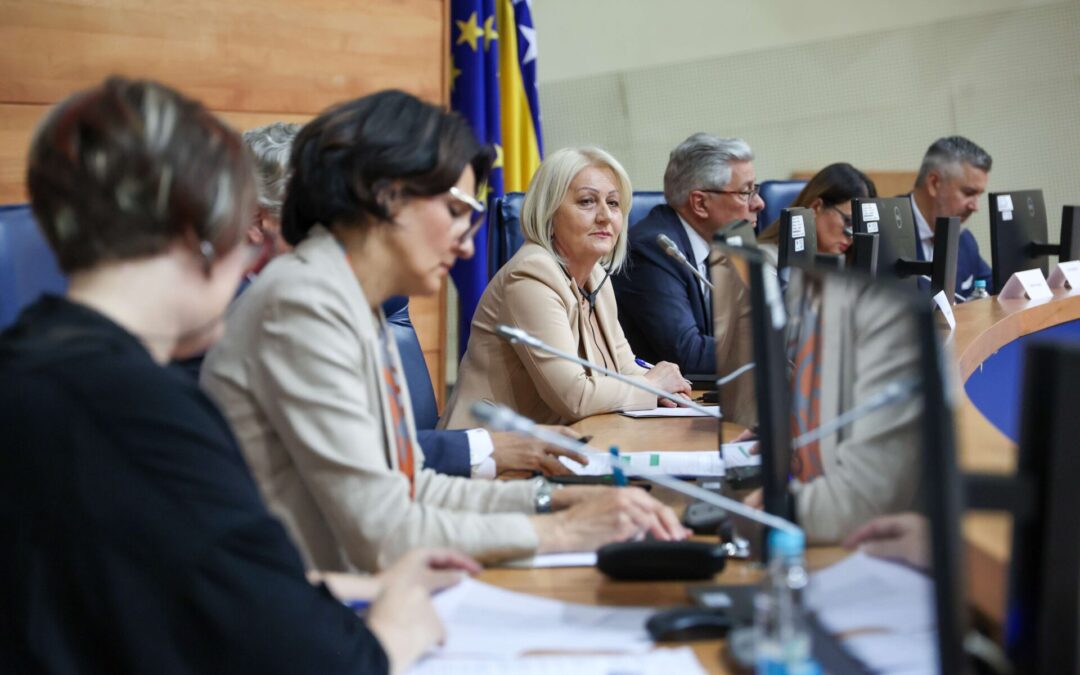“`html
Sarajevo, (Fena) – Due to the constitutional makeup, Bosnia and Herzegovina sometimes needs more time to agree on necessary solutions for access to the European Union, but with full respect for the existing coordination mechanism, constitutional structure, and jurisdiction, all solutions can be reached – it was said on Tuesday at a conference titled “Bosnia and Herzegovina’s Accession Negotiations with the European Union” held at the Parliamentary Assembly of BiH.
The conference, organized by the Office of the Chairwoman of the Council of Ministers of BiH together with the Directorate for European Integration, brought together high officials from all levels of government in BiH, representatives of the European Commission, and heads of membership negotiation teams from countries in the region.
The Chairwoman of the Council of Ministers of BiH Borjana Krišto said that the European Council’s decision to open negotiations represents a historic step forward in the integration process, recognizing their work and progress, but also serving as motivation for future activities.
Krišto recalled that the first high-level meeting with the EU had been held and that they are daily informed about the negotiation process and EU legal acquis, but also that they are initiating procedures and approaching the process of appointing negotiators and the negotiation team.
The Director of the Directorate for European Integration Elvira Habota said that the green light to open negotiations with the EU is a great achievement, but simultaneously the beginning of the most significant phase of this process, which will be extremely demanding for institutions and politics, and society in general.
She announced that the next step is the adoption of the negotiation framework and the convening of the first intergovernmental conference, and that the authorities in Bosnia and Herzegovina have three key tasks ahead of them.
According to Habota, the first is to take all the relevant steps from the European Commission’s 2022 recommendation. She reminded that there are eight steps, a part of which has already been completed, while others are in progress, highlighting the new law on the HJPC and the law on courts in BiH.
– The second task is preparations for explanatory review meetings. Institutions received materials from the European Commission’s explanatory review meetings with North Macedonia, Albania, Ukraine, and Moldova at the end of April, and now have the task to analyze these materials in detail. It is crucial to take this part of the job seriously, because after this preparation we can expect meetings with the European Commission whose aim is to get answers to questions about EU regulations that we gather in the analysis – she said.
The third task, she added, is the establishment of an efficient structure for negotiations, emphasizing that at the last meeting of the College for European Integration, it was assessed as a priority.
The Director for the Western Balkans at the European Commission’s Directorate-General for Neighbourhood and Enlargement Negotiations (DG NEAR) and the chief negotiator on behalf of the EU for BiH Valentina Superti conveyed that the EU’s doors are wide open for BiH and that BiH should use the time and take all relevant steps in reforms, including the adoption of the state budget for 2024, to implement the adopted decisions.
– Negotiations are a demanding task, but the ultimate goal is EU accession. The negotiation process is important because it has the power to enable the country to develop and be secure – she emphasized.
The Head of the EU Delegation in Bosnia and Herzegovina Johann Sattler said that EU integration is an all-encompassing process, and that BiH has many opportunities and work ahead of it. He announced that the EU Commissioner for Enlargement Oliver Varhelyi will soon visit BiH and that his visit should be utilized to resolve the political crisis. (28.5.)
“`
 go to the original language article
go to the original language article
